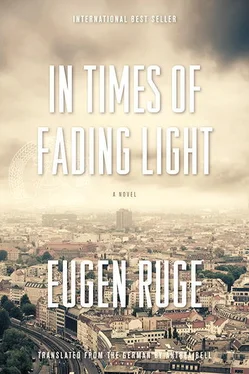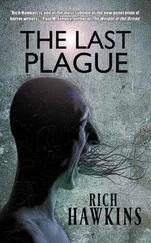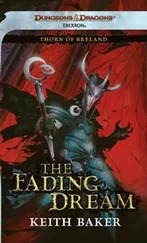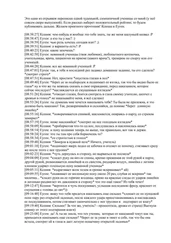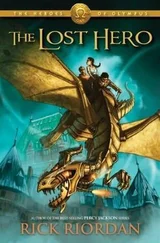Why did Irina never make fried potatoes? With fried eggs. He’d liked the dish since his childhood. Was it too mundane for her? And why, Kurt wondered, while he had plenty of time to avoid the firebugs on the uneven walkway of Neuendorf, why, after thirty years in Germany and however often she was corrected, did she still talk about her Rooshian soul…?
“ He wanted to marry me,” said Nadyeshda Ivanovna suddenly.
Kurt wasn’t sure at first whether she was talking to him or herself. It turned out that she meant Irina’s father who, so Irina claimed (although she had seen him just once in her life, and only from a distance), had been a gypsy. Which Nadyeshda Ivanovna, however, denied. Neither of them was a trustworthy source. Irina tended to see the world as she wanted to see it, while Nadyeshda Ivanovna, who was practically illiterate, had only the most fragmentary awareness of the events that had gone on around her: collectivization, the civil war, the revolution—Kurt had difficulty arranging her reminiscences according to reliable points of reference. And when she now, on their way to Wilhelm’s birthday party, began talking about a city it confused even him for a moment.
“What city do you mean?” he asked.
It turned out that she meant Slava.
In his mind’s eye, Kurt saw “the city”: the road with its gravel surface, the board fences, higher than a man, rising to left and right, with crooked, single-story houses huddling behind them—a settlement of just under nine thousand souls, built on the flat plain between the marshes: the back of beyond, thought Kurt. There could hardly be a place dirtier, uglier, more inhospitable than that godforsaken dump, where, after the end of his prison sentence, he had spent another seven years as what they called an eternal exile. Although if he ignored the way he had fallen into the deepest despair (once a month, as it happened, on a fairly regular basis) on realizing how time was passing without any prospect of his ever being able to begin living a proper, normal life again—if he ignored that, he had to admit that there had been good aspects even to the godforsaken dump.
For instance, the first time Irina had cooked him soup: pea soup made from a bag of dried peas, or more precisely a packet (there were no fresh peas available). Delicious! Even though later, when Irina brought another packet like that back from Slava, the soup had turned out to be almost inedible…
Or swimming in the river in the morning.
Or the white nights, when you sat by the fire together until sunrise, gradually beginning to lose all sense of time… They were all eternal exiles: a collection of eternities. How cheerful sheer despair could make you.
Or the first photographs that Irina and he had taken. Sobakin had brought them the camera from Sverdlovsk, they had mixed their own developing fluid from potash and—what was the stuff called?—sodium sulfite, using a homemade beam balance and several Russian kopeks to act as weights, because the proportions had to be kept exactly right. And now Kurt, who when he thought of those “first photos” was reminded mainly of certain photographs among them, the first that, how could he put it, were not intended for public consumption, when he recollected very clearly, walking arm in arm with Nadyeshda Ivanovna to Wilhelm’s birthday party, the moment when the outlines showed on the sheet of paper floating in their homemade developing fluid, vaguely at first, you could hardly make them out, you weren’t sure which was top and which was bottom, until suddenly—white and strong—Irina’s hips loomed out of the background as it darkened: such an exciting moment that they forgot to put the photograph in the fixing bath and fell on one another where they stood in the darkroom… A pity, thought Kurt, that they’d had to destroy those photographs before emigrating from the Soviet Union.
On the other hand, who knew, maybe it would be like the first packet soup in Slava after ten years in the camp. Anyway, these days Irina didn’t want to know about such things (as she had taken to calling them). She was even beginning to find what had once seemed to her erotic and enjoyable increasingly repellent and vile: a kind of retrospective pessimism. Was that her Rooshian soul too? Or was it the operation on her ovaries? One way or another, life with Irina had suddenly become difficult. And Sasha’s defection to the West wasn’t about to make it any easier.
What was he going to say to Charlotte and Wilhelm?
The house was slowly coming closer. High above the treetops with their fall coloring you could already see the tower room with its battlements and arched windows, and although fundamentally the tower was the acme of a massive aberration of taste (the whole house was a rather badly designed and eclectic building, thought up by a Nazi who had made his fortune and put his dream into practice here in the last days of the war), all the same Kurt could not deny that he had always been fond of the little tower room. It was where he had begun his second life—or was it his third?—and he liked to remember the silence over Neuendorf when he used to open the window at six thirty in the morning and get out his typewriter ready for work, the tingle in the air, the yellow leaves outside the window, although it couldn’t always have been fall there, thought Kurt—but instead of stopping now to study the question of why the plane trees were always yellow in his memory, he had better, he thought, put his mind to answering the questions that he was about to face.
Not that there was really much to think about. What was the point of creating a sensation at this moment? What good would it do anyone? Wilhelm was an obstinate old idiot, and really, thought Kurt, it would only serve him right to hear the truth, retribution for his obstinacy. He really ought, he reflected as the gray facade came into view among speckled tree trunks, the massive door, the small barred windows in the hall that ultimately made the house a fortress, he really ought to be told, thought Kurt, trying to imagine Wilhelm’s face: today, on your birthday, he’d have to say, your grandson has decided he’s fed up with the whole gang of you, many happy returns, thought Kurt, suppressing his impulse to use one of those silly door knockers. The Do Not Knock! notice had always annoyed him. A ban like that—what a way to welcome visitors! Moreover, if the notice wasn’t there probably no one would think of knocking, in fact more than likely no one would even realize that those silly lions’ heads were knockers at all!
Kurt took a deep breath, as deep as if the air he was breathing in would have to last him for several hours, and pushed the bell.
The door opened, a face appeared: a round, stupid face—there was hardly anyone, thought Kurt, who could be so clearly identified at first sight as what he was, a functionairry —as Irina put it, scornfully rolling her “r’s.” It was one of her favorite terms of abuse. Kurt tried to push his way quickly past Schlinger, but once in possession of Kurt’s hand Schlinger wasn’t letting go of it in a hurry, he shook it, he nodded to Kurt in his typical and unpleasantly familiar way, and regrettably Kurt caught himself nodding back in the same way, if only to cut the whole thing short.
“Please wait for Comrade Powileit,” Schlinger called after him.
Kurt had no intention of waiting for Comrade Powileit, but just then, and before Nadyeshda Ivanovna had even taken off her coat, Comrade Powileit herself came tripping along—agile as a spider homing in on her prey.
“Hello, where’s Irina?”
“Irina’s sick,” said Kurt.
“Sick? What’s the matter with her?” inquired Charlotte.
“She isn’t feeling well,” said Kurt.
Читать дальше
